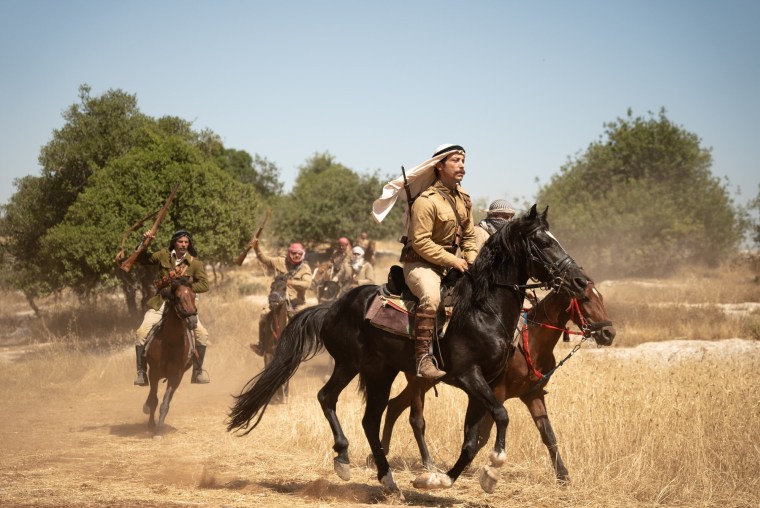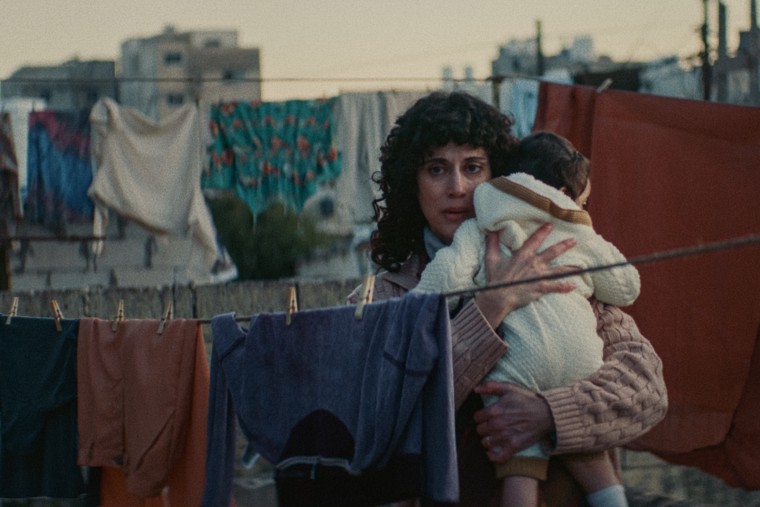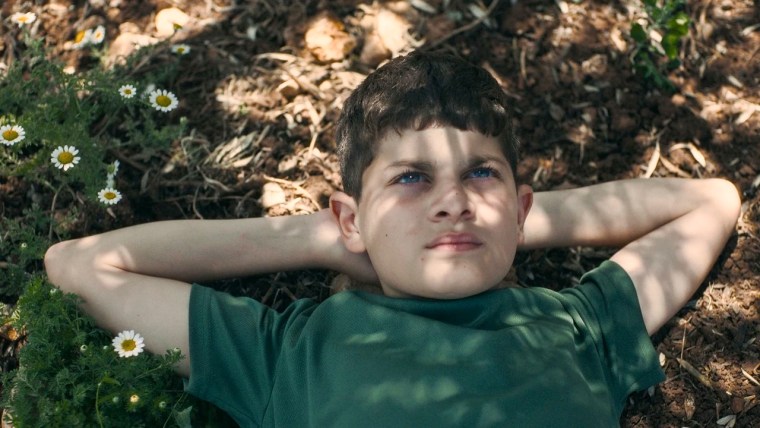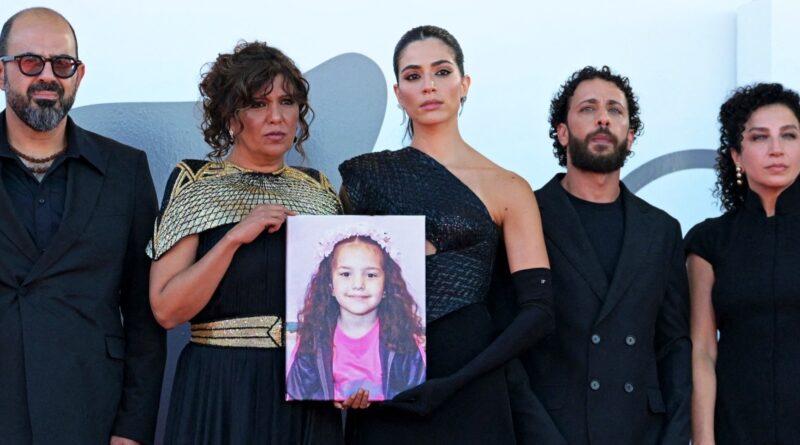Films about Palestinians meet a divided Hollywood
After “The Voice of Hind Rajab,” which counts Brad Pitt, Joaquin Phoenix and Rooney Mara as executive producers, received a nearly 23-minute standing ovation at its Venice Film Festival premiere in September, filmmaker Kaouther Ben Hania took a slew of meetings with potential North American distributors.
Executives praised the film, which follows the Palestine Red Crescent Society’s failed attempt to save Hind, a Palestinian child who was killed in Gaza in 2024 after being trapped in a car under Israeli fire. But not a single major studio or streamer made an offer on the movie, the official Oscar submission of the Tunisian Culture Ministry, Ben Hania said.
“People never say, ‘I’m afraid to pick up a movie,’” Ben Hania said. “Maybe they are. I don’t know. They can’t openly talk about it, because it’s a shame to be afraid of talking about the killing of a child.”
Four movies that tell stories about Palestinian people, set from 1936 to 2024, are competing for this year’s Academy Award for best international feature, just as a ceasefire takes hold in the region. The films, “All That’s Left of You,” “Palestine 36,” “The Sea,” and “The Voice of Hind Rajab,” are screening for awards voters this fall. Three of them are slated to run at the American Film Institute Festival in Los Angeles this week.
Despite interest at the start of filming, and in some cases A-list backers, none of these films have secured a deal with a major studio or streamer, which is uncommon when a title receives buzz overseas. In past years, other foreign language films about major conflicts in history, such as Brazil’s “I’m Still Here” Germany’s “All Quiet on the Western Front” and the United Kingdom’s “Zone of Interest” all found prominent distributors.
As Hollywood has grown more outspoken in recent months about the situation in the Middle East, the challenges of convincing its distributors — the lifelines that can take movies from obscurity to national recognition — remain.
The batch of movies arrives as the crisis in the Gaza Strip remains a flashpoint issue in the entertainment industry. More than 5,000 film and television professionals have signed on to a boycott of Israeli film institutions, while two studios, Paramount and Warner Bros.. have condemned the boycott. Just as some in Hollywood have worried about saying the wrong thing in a social media post or a red carpet interview, others have been vocal, like Javier Bardem, who wore a keffiyeh to the Emmy Awards in September and openly criticized the war in interviews on the red carpet, or Amy Schumer, who posted frequently on her Instagram account calling for the release of the Israeli hostages.

Foreign films that get picked up for distribution often land with smaller independent companies, limiting the films to a few cities and small marketing budgets. International films have also long struggled with marketing to English-speaking audiences with non-English language films.
Multiple distributors declined to comment on the record about why studios aren’t buying the movies about Palestinians, but studio sources said either that their slates were already full or that the movies don’t seem likely to draw large audiences to theaters.
Without a major distributor, it can be hard for films from the region to demonstrate theatrical potential. But last year’s Oscar-winning “No Other Land,” a documentary about a Palestinian community in the occupied West Bank, shows both an appetite among American audiences for Palestinian stories and the complex issues these films face.
When “No Other Land” failed to close a theatrical deal in North America, producers paid to release it in theaters themselves, collecting $2.5 million domestically, enough to make theirs the third highest grossing documentary of the year so far, after films featuring Taylor Swift and Led Zeppelin. The filmmakers then turned down an offer to stream on U.S. platforms from Mubi, citing the London company’s backing from Sequoia Capital, which also invests in an Israeli defense tech startup called Kela. (In August, Mubi’s CEO responded to backlash about Sequoia financing by saying that the profits Mubi generates “do not fund any other companies in Sequoia’s portfolio.”)
For the filmmakers working in the region over the past two years, it’s been a long, arduous road to reach audiences, as the war impacted their physical productions and made potential distributors wary of facing political backlash for releasing their films.
Seeking to fill what they see as a void in the marketplace, Palestinian-American brothers and producers Hamza and Badi Ali formed their own company, Watermelon Pictures, in April 2024. The duo also tapped model Alana Hadid as Watermelon’s creative director and unofficial brand ambassador.
“Truthfully, we wish there was more competition,” Hamza Ali said. “It is almost like all of the pressure is on us to release these films and we feel obligated to do so. We hope that distributors of all sizes will start to engage.”
The Chicago-based company is distributing “All That’s Left of You,” submitted by the Royal Film Commission–Jordan for Oscar consideration, and “Palestine 36,” submitted by the Palestinian Culture Ministry, both of which also received long ovations at film festivals and strong reviews from critics.

Over a year since the company’s launch, the Ali brothers said that when they meet with executives at larger studios and streamers about buying films on Palestinian people, the buyers defer to higher ranking executives, citing the sensitivity of the subject matter, and effectively ending any conversation about a deal.
For some directors, the barriers have come from their own governments.
In Israel, filmmaker Shai Carmeli-Pollack won the country’s version of the Oscar for “The Sea,” the Ophir Award, only to have the Israeli government condemn the film and pull funding for the organization that granted the award. Each country chooses its own film to submit for Oscar consideration, and in Israel, the winner of best film at the Ophir Awards is automatically the country’s submission.
“I wasn’t surprised,” said Carmeli-Pollack, whose film is about a 12-year-old Palestinian boy who wants to join a school trip to the beach. “I’m not the first film that they attacked. In a way, they saved us a lot of explaining to the world that we do not represent this government.”
In a statement issued on social media in September regarding the decision, Israeli Culture Minister Miki Zohar wrote in Hebrew that he believes the country’s taxpayers shouldn’t have to support a “ceremony that spits on the heroic Israeli soldiers. (The film features a soldier questioning a Palestinian boy and his father as they are trying to go to the beach).

Carmeli-Pollack shot his movie in the West Bank in the summer of 2023, and he said he saw distributors’ enthusiasm for it evaporate after the Oct. 7 attacks. “The Sea” is now being released in the U.S. by Menemsha Films, a small Los Angeles-based company that distributes a variety of Jewish films.
Stories shot in the Palestinian territories have always faced hurdles when it comes to securing locations, but the crisis in Gaza made physical production virtually impossible, directors who spoke to NBC News said.
Cherien Dabis, the director, writer and star of “All That’s Left Of You,” was scheduled to start shooting her film in October 2023 in Jericho. Plans changed after the Oct. 7, Hamas-led attacks on Israel, which led Dabis to evacuate her cast and crew from the West Bank.
“We were hearing fighter jets and cities were being sealed off, checkpoints were closing,” she said. “We thought maybe we’d come back to Palestine, things would blow over. We had no idea.”
We need to make sure that we’re speaking to the masses.
-Cherien Dabis, the director, writer and star of “All That’s Left Of You”
Dabis, whose movie she said is backed by a mix of European and Arab financing, ended up shooting in Greece, Cyprus and Jordan, telling the fraught history of the region through three generations of one family who were expelled from Jaffa in 1948.
“Palestine 36” director Annemarie Jacir was also scheduled to shoot her historical drama in October 2023 in the West Bank, with a cast that includes British actor Jeremy Irons and Palestinian actress Hiam Abbass.
But after Oct. 7, “There was no more insurance,” Jacir said. “No agents were going to send any of their cast to Palestine to film.” Jacir shot most of her movie in Jordan but was eventually able to return, with a much smaller crew, to film some scenes in Bethlehem, Jaffa and Jerusalem.
In order to help their movies find wider audiences, some are enlisting high-profile Hollywood advocates.
Dabis recruited Javier Bardem and Mark Ruffalo, two of the entertainment industry’s most outspoken figures on Gaza, as executive producers.
“Given what we’ve watched unfold in the last two years, we understand that we need to break out of any kind of echo chamber,” she said. “We need to make sure that we’re speaking to the masses.”
On Dec. 16, the Academy of Motion Picture Arts and Sciences will announce a narrowed list of 15 movies in contention for the international Oscar, ahead of the awards telecast March 15.





